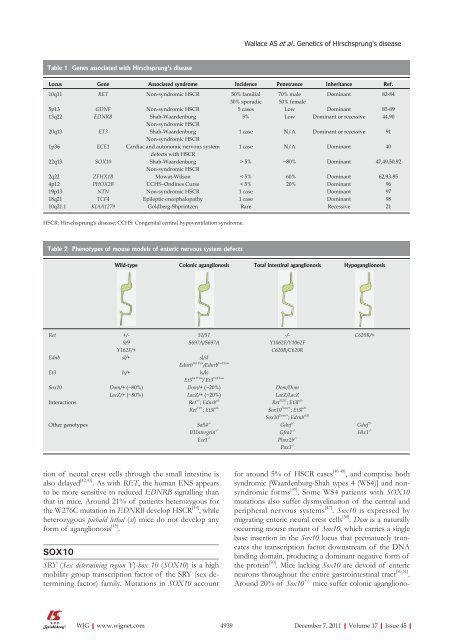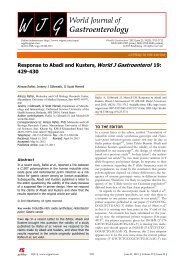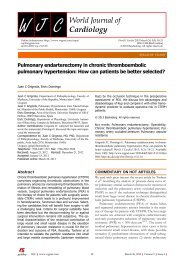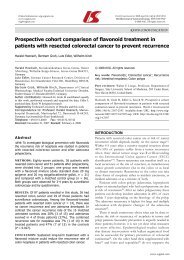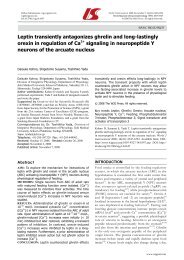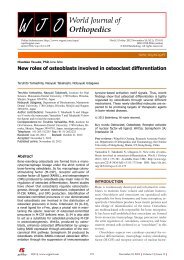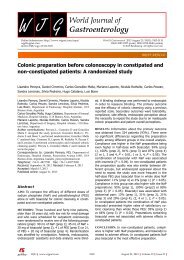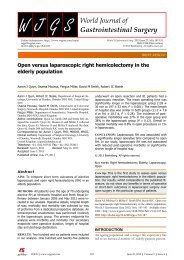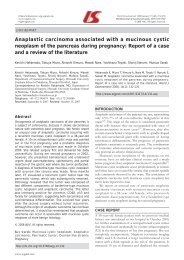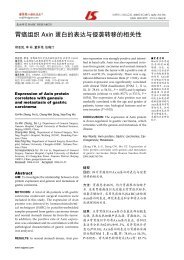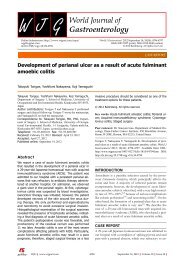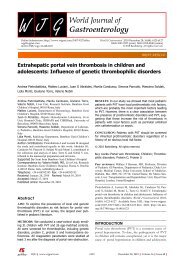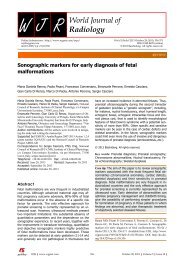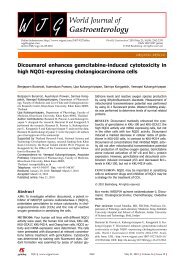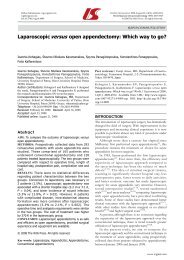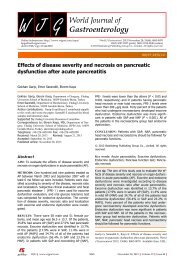45 - World Journal of Gastroenterology
45 - World Journal of Gastroenterology
45 - World Journal of Gastroenterology
You also want an ePaper? Increase the reach of your titles
YUMPU automatically turns print PDFs into web optimized ePapers that Google loves.
Table 1 Genes associated with Hirschsprung's disease<br />
Locus Gene Associated syndrome Incidence Penetrance Inheritance Ref.<br />
10q11 RET Non-syndromic HSCR 50% familial 70% male Dominant 82-84<br />
30% sporadic 50% female<br />
5p13 GDNF Non-syndromic HSCR 5 cases Low Dominant 85-89<br />
13q22 EDNRB Shah-Waardenburg<br />
Non-syndromic HSCR<br />
5% Low Dominant or recessive 44,90<br />
20q13 ET3 Shah-Waardenburg<br />
Non-syndromic HSCR<br />
1 case N/A Dominant or recessive 91<br />
1p36 ECE1 Cardiac and autonomic nervous system<br />
defects with HSCR<br />
1 case N/A Dominant 40<br />
22q13 SOX10 Shah-Waardenburg<br />
Non-syndromic HSCR<br />
> 5% ~80% Dominant 47,49,50,92<br />
2q22 ZFHX1B Mowat-Wilson < 5% 60% Dominant 62,93-95<br />
4p12 PHOX2B CCHS–Ondines Curse < 5% 20% Dominant 96<br />
19p13 NTN Non-syndromic HSCR 1 case Dominant 97<br />
18q21 TCF4 Epileptic encephalopathy 1 case Dominant 98<br />
10q21.1 KIAA1279 Goldberg-Shprintzen Rare Recessive 21<br />
HSCR: Hirschsprung's disease; CCHS: Congenital central hypoventilation syndrome.<br />
Table 2 Phenotypes <strong>of</strong> mouse models <strong>of</strong> enteric nervous system defects<br />
tion <strong>of</strong> neural crest cells through the small intestine is<br />
also delayed [42,43] . As with RET, the human ENS appears<br />
to be more sensitive to reduced EDNRB signalling than<br />
that in mice. Around 21% <strong>of</strong> patients heterozygous for<br />
the W276C mutation in EDNRB develop HSCR [44] , while<br />
heterozygous piebald lethal (sl) mice do not develop any<br />
form <strong>of</strong> aganglionosis [<strong>45</strong>] .<br />
SOX10<br />
SRY (Sex determining region Y)-box 10 (SOX10) is a high<br />
mobility group transcription factor <strong>of</strong> the SRY (sex determining<br />
factor) family. Mutations in SOX10 account<br />
WJG|www.wjgnet.com<br />
Wild-type Colonic aganglionosis Total intestinal aganglionosis Hypoganglionosis<br />
Ret +/- 51/51 -/- C620R/+<br />
9/9 S697A/S697A Y1062F/Y1062F<br />
Y162F/+ C620R/C620R<br />
Ednb sl/+ sl/sl<br />
Ednrb tm1Ywa /Ednrb tm1Ywa<br />
Et3 ls/+ ls/ls<br />
Et3 tm1Ywa / Et3 tm1Ywa<br />
Sox10 Dom/+ (~80%) Dom/+ (~20%) Dom/Dom<br />
LacZ/+ (~80%) LacZ/+ (~20%) LacZ/LacZ<br />
Interactions Ret +/- ; Ednrb s/s<br />
Ret 51/51 ; Et3l s/ls<br />
Ret 51/+ ; Et3l s/ls<br />
Other genotypes Sall4 -/-<br />
B1Intergrin -/-<br />
Ece1 -/-<br />
Wallace AS et al . Genetics <strong>of</strong> Hirschsprung's disease<br />
Sox10 Dom/+ ; Et3l s/ls<br />
Sox10 Dom/+ ; Edrnb sl/sl<br />
Gdnf -/-<br />
Gfra1 -/-<br />
Phox2b -/-<br />
Pax3 -/-<br />
Gdnf +/-<br />
Hlx1 -/-<br />
for around 5% <strong>of</strong> HSCR cases [46-48] , and comprise both<br />
syndromic [Waardenburg-Shah types 4 (WS4)] and nonsyndromic<br />
forms [49] . Some WS4 patients with SOX10<br />
mutations also suffer dysmyelination <strong>of</strong> the central and<br />
peripheral nervous systems [47] . Sox10 is expressed by<br />
migrating enteric neural crest cells [50] . Dom is a naturally<br />
occurring mouse mutant <strong>of</strong> Sox10, which carries a single<br />
base insertion in the Sox10 locus that prematurely truncates<br />
the transcription factor downstream <strong>of</strong> the DNA<br />
binding domain, producing a dominant negative form <strong>of</strong><br />
the protein [50] . Mice lacking Sox10 are devoid <strong>of</strong> enteric<br />
neurons throughout the entire gastrointestinal tract [50,51] .<br />
Around 20% <strong>of</strong> Sox10 +/- mice suffer colonic agangliono-<br />
4939 December 7, 2011|Volume 17|Issue <strong>45</strong>|


